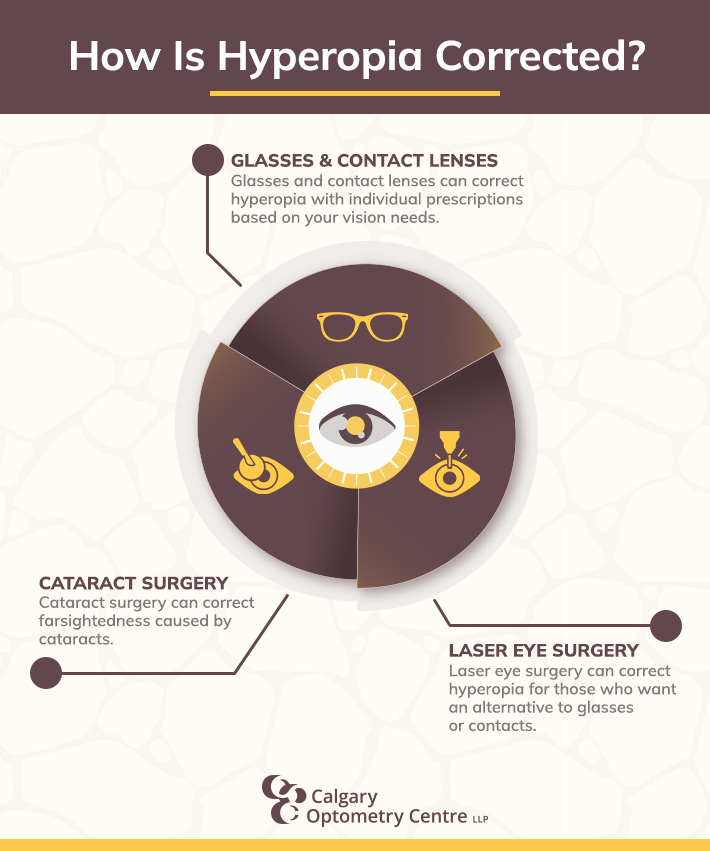Those who live with hyperopia know that it can have permanent effects on a person’s quality of life. Fortunately, there are options for managing hyperopia.
As one of several relatively common refractive errors, there are several treatments available for hyperopia.
Farsightedness caused by hyperopia can be corrected with glasses, contact lenses, and laser eye surgery.
Finding the right solution for hyperopia correction often starts with a comprehensive eye exam, but there are other factors that we take into consideration as well, such as your lifestyle and your comfort level with the options available for treatment.
How Is Hyperopia Treated?
As with other refractive errors, like myopia, vision correction is often the first goal of treating hyperopia. Glasses and contact lenses are 2 common options for correcting farsightedness caused by myopia—but they are not the only options.
For those with lifestyles that may be affected by glasses or contact lenses, laser eye surgery may be worth exploring as an option for treatment. In cases where hyperopia is caused by cataracts, cataract surgery may be recommended to address the underlying cause of farsightedness.
Glasses & Contact Lenses
Both glasses and contact lenses can be used to correct the vision of those affected by myopia.
When reading a prescription for glasses meant to correct farsightedness, you may notice a plus (+) symbol next to the numbers used for each lens. There will usually be a minus (–) symbol for glasses or contact lenses meant to correct nearsightedness.
There are also glasses and contact lenses with multifocal, bifocal, and progressive prescriptions that can help correct vision at multiple distances.
Cataract Surgery
Hyperopia can occur in approximately half of all people with cataracts. In those situations, cataract surgery may be recommended to replace the lens causing blurry vision.
Cataract surgery is one of the most common procedures in Canada and is generally considered a safe procedure. It is typically an outpatient procedure that involves replacing your eye’s natural lens with an artificial lens.
Laser Eye Surgery
For those who do not enjoy the experience of wearing glasses or contacts, laser eye surgery may be an alternative option for correcting hyperopia.
LASIK (laser-assisted in situ keratomileusis) and PRK (photorefractive keratectomy) are 2 common procedures that involve using a laser to reshape the cornea. LASIK involves using a layer to create a thin flap in the cornea, while PRK involves removing the outer layers of the cornea.
During a consultation, we can help you determine whether laser surgery or another form of vision correction can meet your needs for hyperopia treatment.

What Exactly Is Hyperopia?
Hyperopia is one of several refractive errors that can change your ability to see clearly. It’s typically caused by the shape of a person’s eye or the curvature of their cornea, and it can cause close-up vision to appear blurry while distance vision remains clear.
Light needs to focus on your retina for your brain to process images clearly. However, when your eye is shorter than it is wide, its shape can cause light to focus at a point behind your retina, resulting in blurred vision. The curvature of your cornea—the front part of your eye—can also have this effect.
Who Can Be Affected By Hyperopia?
Hyperopia can affect people at any age, and it can be more challenging to recognize when it affects children and seniors because of the possibility for it to go unnoticed or be attributed to other conditions.
Many people are affected by some degree of mild to moderate farsightedness without knowing it. It’s only when hyperopia causes noticeable vision challenges that it becomes a problem people seek treatment for.
It’s estimated that over half of the people who wear glasses are wearing them because of either hyperopia or presbyopia, another refractive error that can cause farsightedness as a result of age-related changes to the eye’s lens.
How Do You Know You Have Hyperopia?
Hyperopia is typically diagnosed with a comprehensive eye exam—for both adults and children. Testing for hyperopia must go beyond a simple vision screening—the type of test that involves reading letters off a chart from a distance—because it’s possible for those affected by hyperopia to read the letters in a vision screening clearly from a distance.
What Are the Symptoms of Hyperopia?
In addition to farsightedness—blurry vision up close—hyperopia can cause the following symptoms:
- Eye strain
- Tension
- Discomfort
- Headaches
Many of these symptoms can also be caused by other conditions, so it’s important to speak with an eye doctor if you or a family member is experiencing problems related to your vision and eye health.
Determining the cause of vision challenges is the first step to providing treatment that can correct conditions like farsightedness.

What’s the Difference Between Hyperopia & Presbyopia?
Both hyperopia and presbyopia can cause farsightedness, but they differ in their exact causes. Hyperopia is usually caused by the shape of your eye or cornea, while presbyopia is typically an age-related condition caused by changes to your eye’s lens.
The exact treatments available for correcting the farsightedness these conditions cause can differ, so it’s important to speak with an eye doctor about which condition is affecting your vision.
How Can You Prevent Hyperopia?
In some cases, hyperopia develops naturally over time due to genetic factors. However, it can also develop as a result of environmental factors and aging. In those cases, some habits can help prevent hyperopia or reduce its effects.
In general, the strategies that can help prevent and address hyperopia include:
- Managing other chronic health conditions, such as diabetes and high blood pressure
- Wearing sunglasses to help prevent cataracts
- Avoiding eye injuries with protective eyewear
- Eating a balanced, healthy diet
- Quitting smoking and avoiding tobacco products
Schedule a Comprehensive Eye Exam
Getting regular eye exams helps find and address vision problems during their early stages. At Calgary Optometry Centre, we provide comprehensive eye exams with the goal of enhancing your eye health and quality of life. Book an appointment with us to get personalized support for your family’s vision. We can help you determine the right form of vision correction for hyperopia and many other refractive conditions.




